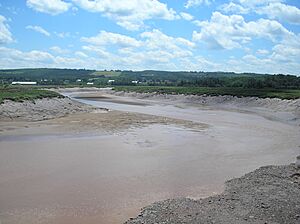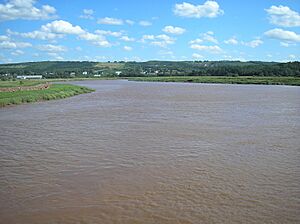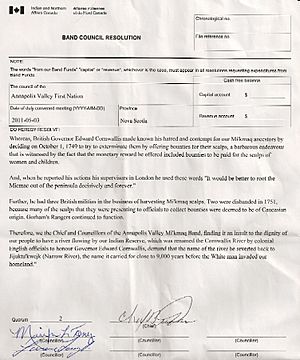Cornwallis River facts for kids
Quick facts for kids Cornwallis River |
|
|---|---|
| Country | Canada |
| Province | Nova Scotia |
| Physical characteristics | |
| Main source | North Mountain |
| River mouth | Minas Basin sea level |
| Length | 48 km (30 mi) |
The Cornwallis River is a river located in Kings County, Nova Scotia, Canada. It flows for about 48 kilometers (30 miles) through the eastern part of Kings County. The river starts on the North Mountain near Grafton. It then flows into the Minas Basin close to Wolfville.
The lower part of the river, starting from Kentville, is affected by the ocean's tides. This area has large tidal marshes, which are wetlands flooded by tides. Higher up the river, near Berwick, the river gets water from the Caribou Bog. The main source, however, is a stream on the North Mountain at Grafton.
Contents
River History: What Was the Cornwallis River Called Before?
The first people to live in this area were the Mi'kmaq. They called the river The Narrow River, or Chijekwtook. You might also hear it called Jijuktu'kwejk (pronounced "Gee-gee-wok-tuk").
Early European Names for the River
When Samuel de Champlain arrived in the early 1600s, he named the river Riviere St. Antoine. Later, the Acadians called it the Riviere des Habitants. The Acadians built many settlements around the river's mouth. These included the village of Grand-Pré and a smaller one at New Minas. They also built large dykes to protect their farmland from the tides.
How the River Got its Current Name
After the Acadians were forced to leave in 1755, new settlers arrived in 1760. These were the New England Planters. They named the river after the towns they built along its banks. The river first became known as the Horton River. This name came from Horton Township, a major Planter settlement. Horton Township was named after George Montagu-Dunk, 2nd Earl of Halifax, who was in charge of English settlement in Nova Scotia.
However, as time passed, more people and businesses moved upriver to the Kentville area. This area was in Cornwallis Township, which was named after Edward Cornwallis. He was the first governor of Nova Scotia. Because of this shift, the river's name changed to Cornwallis River by 1829.
Efforts to Change the River's Name
In 2011, the Mi'kmaq people of the Annapolis Valley First Nation voted to change the river's name. They want it to go back to its original Mi'kmaw name, Jijuktu'kwejk. Chief Brian Toney of the Annapolis Valley First Nation explained why. He said that crossing the Cornwallis River reminds his people of Governor Edward Cornwallis. In 1749, during a time of conflict, Cornwallis offered money for the scalps of Mi'kmaq people, including women and children. This proposal has started a discussion about renaming places and how history is shown.
Transportation: How Was the River Used?
The Cornwallis River was an important route for travel and trade in the past. People could carry goods from the river through the Berwick area to the start of the Annapolis River. Smaller coastal ships used docks along the river as far as Kentville. Larger ships and later steamships used Port Williams to export farm products and timber. The Cornwallis Valley Railway, a train line, was named after the river in 1889. It crossed the river at Kentville.
Ecology: What About the River's Health?
The Annapolis Valley is a very important farming area in Nova Scotia. Farmers use the river for irrigation and drainage. However, a lot of runoff from farms and sewage from towns have caused serious pollution problems. In 2002, the Cornwallis River was named one of Canada's ten most endangered rivers. It was even called "little more than a farm sewer."
Today, many projects are working to improve how farms use the river. They are also upgrading the sewage systems in towns along the river. Communities like Wolfville, Port Williams, Kentville, and Berwick all have facilities to treat their sewage before it goes into the river.
Communities Along the River
 | Roy Wilkins |
 | John Lewis |
 | Linda Carol Brown |




